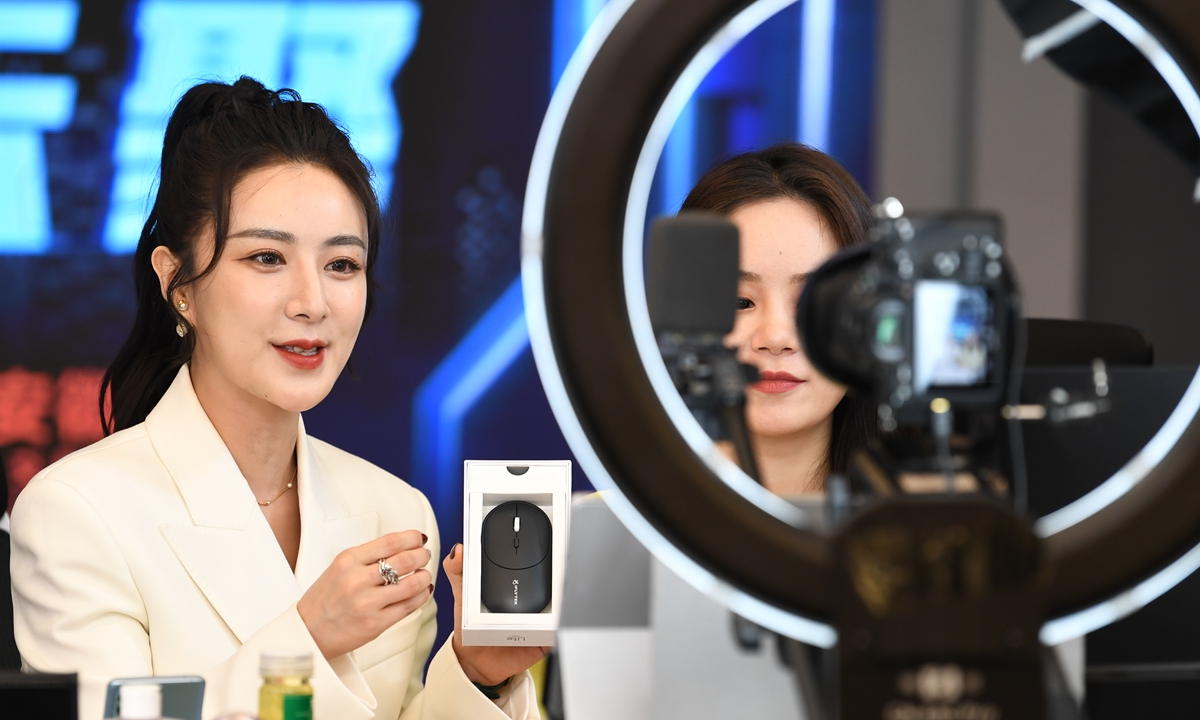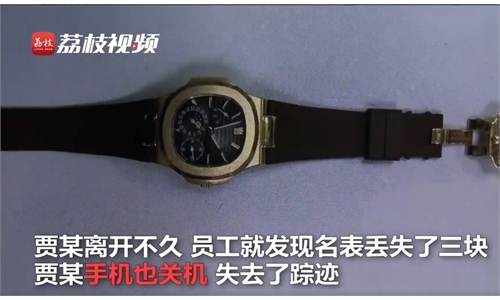China's livestreaming prowess in focus as record fine sounds alarm over unregulated practices

Viya introduces products during a livestream show in April. Photos: VCG
A whopping 1.34 billion yuan ($210.3 million) fine for tax evasion levied on Huang Wei, otherwise known as Viya and dubbed China's livestream queen, prompted an explosion of jaw-dropping feelings about the country's livestreaming industry, one of the most enviable parts of China's digital economic strength that buttressed the economy's recovery from the COVID-19.
The Monday announcement of the record fine, while shining a spotlight on the unchecked growth of top marketing influencers, unwittingly pushes the country's livestreaming prowess forward. With the top two Chinese livestreamers raking in sales revenues almost equal to Liechtenstein's GDP in 2020, or more than 60 percent of US e-commerce giant eBay's annual revenue for last year, it could be said that China has established itself as a formidable influencer in the livestreaming world.
Buoyed by the country's head start in livestreaming, influencers reached by the Global Times remain largely bullish on future prospects, especially on expansion into overseas markets. Meanwhile, they are wary of the repercussions of the Viya incident as the growth in the area of livestreaming that has partially been inflated by unregulated practices will likely come under intense scrutiny as part of a broader move to steer the internet economy toward a healthier and strictly law-abiding growth path.
Blazing the trail
Behind the fast rise and even faster fall of Huang was the meteoric growth of China's livestreaming industry, which set the trend for the rest of the world to follow.
The 36-year-old singer-turned-livestreamer rose to prominence over the past few years since she topped a Taobao ranking with annual earnings of 30 million yuan in 2018. The livestream queen had outshone most competitors until the Monday decision by tax authorities in Hangzhou, East China's Zhejiang Province, brought almost all those shining numbers and titles to naught.
All the Viya-branded e-commerce and social media accounts were shut down Monday night.
Moreover, the China Federation of Internet Societies on Tuesday announced its revocation of Huang's title as an internet integrity promotional ambassador, citing the grave social impact from her tax evasion.
While Huang's wrongdoings seem to have put an abrupt end to her livestream career, her feat of successfully selling a rocket for 40 million yuan in April 2020 at Taobao Live was still reverberating.
In November 2019, Los Angeles-based Kim Kardashian also forayed into China's livestream world, by partnering with Huang, selling 15,000 bottles of her namesake brand of perfume in mere minutes.
In another striking sign of such charisma, a livestream session organized by the China Media Group and hosted by Huang's rival Li Jiaqi in November helped sell 120,000 cans of pine nuts from Afghanistan within minutes for over 10 million yuan.
Huang and Li, the top two livestreamers in China, recorded combined sales revenues of 53 billion yuan, or $6.8 billion, in 2020, industry data showed.
The number was close to Liechtenstein's GDP in 2020, which according to the World Bank, stood at $6.84 billion.
The reading was also equivalent to roughly 66 percent of eBay's $10.3 billion revenue for the whole of 2020.
In yet another comparison, sales revenues generated by the two top Chinese livestreamers was over 2.5 times the full-year revenue of the US video communications giant Zoom. The total revenue for Zoom's fiscal year ended January 31 was $2.65 billion, according to its yearly fiscal disclosure.
Such impressive comparisons arguably speak to the country's trailblazing strength in livestreaming that shot to global fame since Taobao Live was launched in 2016.
Also launched five years ago, Amazon Live has been very low key until Amazon began committing more tangibly to the channel in early 2019 with the announcement of an app that enables users to access livestream sales directly from their phones.
China has successfully exported its unique model of livestream shopping overseas, particularly in the US and European markets, representing a significant step in boosting its soft power, analysts said.
"China is way ahead of the US in terms of e-commerce development, and our foreign peers could draw experiences from China's early start in [livestream]," Feng Xuefeng, a manager at SakTok, a cross-border livestreaming agency based in Shenzhen, South China's Guangdong Province, told the Global Times on Tuesday.
The company mainly hosts English-language live broadcast on platforms such as Amazon.
According to Feng, the live broadcasting market in the US and Europe has grown 100-fold since last year, while in China the market only doubled due to its already much larger base. And as the traditional sales bonanza from Black Friday to the Christmas holidays approaches, the company's live broadcasting sessions are fully scheduled. On Black Friday, it hosted a live broadcast from 8 am to midnight.
Thought-provoking side
Despite the fanfare, top influencers dominate the sales rankings, with a galaxy of little-known livestreamers scrambling to carve out a path to a livestream-enabled fortune. The record fine will serve as a wake-up call for the booming sector to align with the country's push against the unchecked expansion of the digital economy, insiders said.
The craze for live broadcasts is ubiquitous in China, as seen by randomly walking into a shopping mall, where four out of five brick-and-motor stores have set up a dedicated space - illuminated by a specially designed circle light - for online broadcasting.
As of the end of 2020, the country's livestream user population had hit 617 million while livestream accounts had cumulatively exceeded 130 million, according to findings from an industry report in May.
"Our company has made it a rule that several larger stores in Beijing need to host live broadcasts every day for five hours, and this is one of the key indexes gauging our performance," a sales person at a store of Danish brand Jack Jones in Beijing's Chaoyang district, told the Global Times on condition of anonymity.
"We hired a good-looking host for live broadcasting. The show is not sales-driven, but rather to communicate with our customers, informing them of our latest products and accumulating popularity," the employee said, adding that only around 100 people will view the livestream every day and only several items a day are sold on average.
The livestream e-commerce sector is estimated to hit 2 trillion yuan in 2021, with a 90 percent growth, according to the Securities Daily, and the compound annual growth rate for the next five years is expected to amount to 50 percent.
But livestream marketing is by no means evenly distributed.
Last year, the top 20 livestream influencers and brands, including Viya and Li, posted 106.44 billion yuan in sales revenue, per Global Times' calculation based on a livestream sales ranking complied by an internet celebrity and livestream-focused social media platform called jinriwanghong, or literally "today's internet celebrity."
That suggests the top two influencers accounted for over half of the 20 in sales terms.
Looking ahead, the Viya incident came across as leaving many of the livestream queen's lesser-known peers contemplating the future of China's influencer world.
"We're spooked. Almost everyone feels we're facing an unprecedented crisis after the industry has peaked. Is the bubble about to burst?" Da Shui (pseudonym), a partner of a small-scale Beijing-based Multi-Channel Network (MCN) institution, told the Global Times on Tuesday.
Shui entered the industry at the beginning of this year, obsessed with stories of how the industry - which everyone is entitled to enter regardless of their work experience and education background - could create wealth for ordinary people. She now has more than 100,000 followers across various platforms, including Taobao, Douyin and Baidu.
"The industry in fact has been developing in a quite chaotic manner," Shui said, taking example of common industry practices, such as fabricating sales volumes, using "special means" to drive up traffic for live broadcasting and luring consumers with claimed lowest price, which all violate retail or online laws.
"Tax evasion is also quite common, as some live broadcast studios require brands not to make out invoices when paying commissions," Shui said, admitting that it is time for regulators to rein in the growth of industry.
Industry insiders compared the livestreaming industry's structure to a pyramid, highly competitive yet only those at the top have a say. "As a middle-bottom broadcaster, we only charge several thousand yuan for product sales during live broadcasts, but this could top 400,000 yuan for cooperation with a top broadcaster. So everyone aspires to be top, but it is almost impossible without views being created by MCNs - and that's how traffic is forged," Shui noted.



